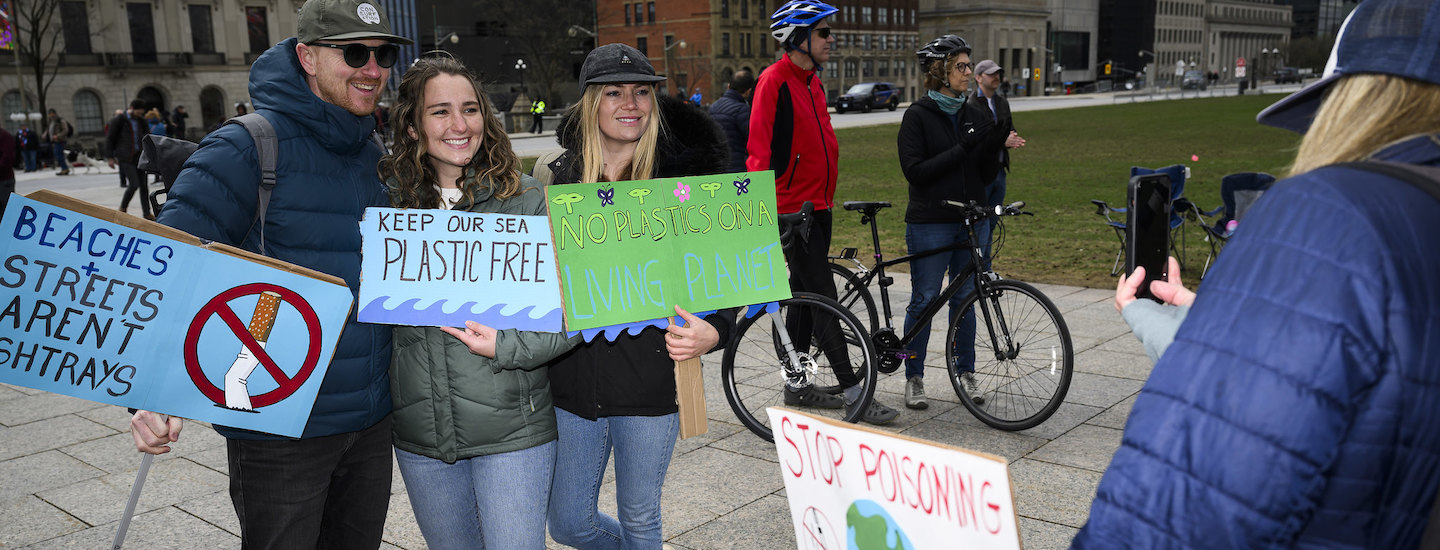
Previous Installments
- March to End the Plastic Era!
- From the Ground as Negotiations Continue
- Surfrider Mobilizes Student Network to Support the Global Plastics Treaty
- Reflections on ‘Strength and Perseverance’
- Student Activist Experience
- Plastics & EJ with Activist Lucy Drummond
INC-4 Concludes
After days of oft-circular discussions and final agreement on what sort of work should take place before the final negotiations happening near the end of the year, the fourth meeting of – get ready for it – the United Nations Environment Program (UNEP) Intergovernmental Negotiating Committee (INC) for a global agreement to end plastic pollution wrapped at 3 a.m. Tuesday, April 30. Staff and volunteer activists from Surfrider and Surfrider Canada attended all nine days of the extensive meetings, presentations and events, ultimately departing with a blend of disappointment and optimism.
The Not-So-Great
A Center for International Environmental Law (CIEL) analysis released during INC-4 found that nearly 200 fossil fuel and chemical industry lobbyists registered for the negotiations, including at least 16 on country delegations. Perhaps that’s why, even after repeatedly hearing from U.S. residents whose families and neighbors have been sickened by toxic plastic production, the United States delegation continues to refuse to commit to the true solutions available to end the plastic pollution crisis. This week’s global plastics treaty negotiations could have advanced comprehensive commitments to reduce plastic production, but the U.S. continues to eschew high ambition in favor of greater alignment with other fossil fuel-producing countries.
Further, the outsized influence of the United States holds back the progress “high ambition” countries are willing to embrace. We’re already short of time to remedy the plastic pollution crisis and now only one INC meeting away from a resolution that could make a better, healthier world for all. We need and deserve better leadership from the U.S.
The Good News
Perú and Rwanda stood out as champions for proposing intersessional work (the U.N. version of homework) aiming to reduce global use of virgin plastics by 40% of 2025 levels by 2040. More than 50 countries strongly supported this proposal, showing that even without global consensus, efforts to reduce the plastic pollution crisis will carry on.
Likewise, working together toward a better treaty strengthened Surfrider’s own international relationships. We joined Surfrider Canada at their booth in the “Plastic Action Zone,” an official side event of INC-4, where several presentations and panels took place. The booth featured two of Surfrider Canada’s campaigns, an effort to ban foam docks and one to eliminate cigarette butt pollution. With support from the U.S.-based Surfrider team, Surfrider Canada’s Executive Director Lucas Harris and Regional Manager Lilly Woodbury engaged attendees on the issues with a scale model showing how foam docks deteriorate in the water – an issue our Washington chapters took on last year – plus presented a 3D-printed “Smoked Tuna” full of cigarette butts collected from the Ottawa streets. Gross, but effective!

Jennifer Savage, Surfrider Foundation's Senior Manager, Plastic Pollution Initiative, joined staff from Azul, 5 Gyres, Ocean Conservancy, The Nature Conservancy, and Monterey Bay Aquarium joined Congressman Jared Huffman to discuss pressing the United States to commit to a stronger Global Plastics Treaty
Finally, leading members of Congress are pushing the State Department and Biden Administration to take a stronger stance in the negotiations. We had the chance to meet with Representative Jared Huffman, co-sponsor of the Break Free From Plastic Pollution Act.
Next Steps
In the final hours, delegates opted to move forward with “intersessional” work related to plastic products, chemicals of concern in plastic products, product design, reusability, and recyclability. The effort to prepare for INC-5 is welcome news, although the work assigned fails to include examining the extraction or production reduction measures desperately needed to slow climate change, preserve biodiversity, and prevent pollution.
In addition to the Rwanda/Perú proposal, several countries launched the Bridge to Busan Declaration on Plastic Polymers to rally parties in support of keeping the provision for addressing primary plastic polymers alive in the treaty text and building momentum for the fifth (and last planned) round of negotiations in Busan, Republic of Korea later this year.
Surfrider joins the Break Free From Plastic movement’s call for countries to act on the demands of Indigenous Peoples as rightsholders entitled to a healthy environment. Indigenous Peoples, together with allies in fenceline and frontline communities around the world, have been explicit in their demands for protection from the harms of fossil fuel extraction and of false solutions like incineration and chemical recycling – which is a requirement for defending their right to a healthy environment – as well as in their call for real circular solutions like non-toxic reuse systems and other Indigenous practices.
Surfrider will continue to pressure the Biden Administration to step up and leverage the U.S.’s influence to help end plastic pollution across the planet. Add your voice! Demand A Strong Global Plastics Treaty to Protect Our Ocean now!
